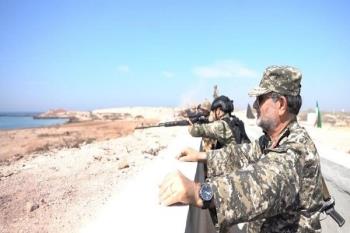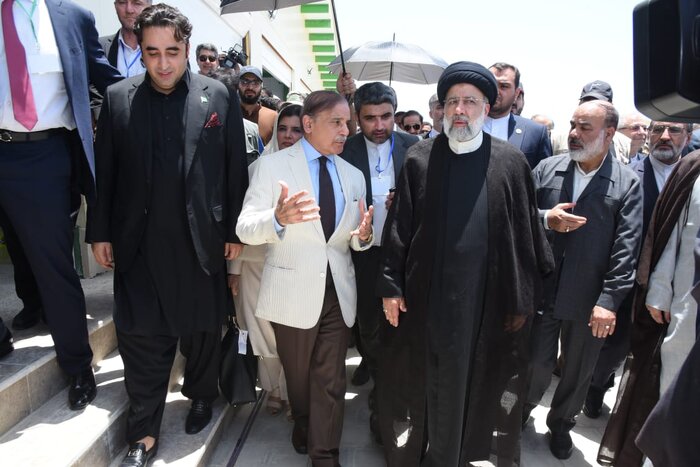Alwaght- The one-day visit of President Seyyed Ibrahim Raisi of Iran to the country’s border province of Sistan and Baluchestan was important from diplomatic and developmental aspects. In addition to inaugurating civil projects, the president issued a serious warning to rulers of Afghanistan about Iran’s water share from Helmand River and met with Pakistan’s Prime Minister Shehbaz Sharif in the zero point of border.
Iranian-Pakistani officials' border meeting
The president jointly with Sharif inaugurated Pishin-Mand border market. Also power exchange grid of Pelan-Jivani was launched on the Pishin Border Crossing via video conference. In this ceremony, the president described the presence of the Pakistani PM and other officials at the border point as a message of the high security of the region, adding: “Today, the two countries see the border as an opportunity and not a threat, and consider any insecurity on the other side as insecurity for themselves.”
The Pakistani PM, for his part, described opening the border markets as ushering in a new period of efforts for development of the region.
“The opening of the power post and transmission line is a source of great pleasure, and besides thanking the minister of energy and the Iranian people involved in the implementation of this project, I am particularly grateful to my brother Ayatollah Raisi, who personally pursued ending delay of the implementation of this project though this delay was from Pakistani side,” Sharif held.
The president and the PM also held a meeting with the presence of officials of the two countries. In the meeting, Raisi suggested that the tree volume is yet to reach the favorable point, adding that the Islamic Republic is ready to expand ties in trade, agriculture, industry, science, and technology.
Sharif thanked Raisi and other Iranian officials on the border and described it a “border of friendship, brotherhood, and development.” He pointed to the significance of security of the border areas of the two sides, and highlighted his government’s resolution to eradicate insecurity in the region.
Geopolitical nature of Iran-Pakistan relations
Border security is the most important issue under major security sense that has both national and trans-national impacts. Regulation of the foreign relations based on the principle of good neighborliness and convergence is the most essential and reliable way towards establishing sustainable security. In pursuit of this principle, Islamic Republic of Iran is no exception. Due to historical, religious, and cultural bonds with Iran on the one hand and the special internal conditions on the other hand, the eastern neighbors of Iran have always made challenges and, in parallel, opportunities for Iran. The Iranian-Pakistani relations which are relatively long have such nature.
At the same time, Iran was one of the first countries to recognize Pakistan after its independence in August 1947. So, this country was also one of the first countries to recognize the Islamic Republic of Iran after the Islamic Revolution of 1979. Since then, on the one hand, emphasis on the principle of good neighborliness and avoiding direct conflict in the framework of a pragmatic policy, and on the other hand, the continuation of threats and challenges, especially on the borders, have been the two main features governing the relations of the two sides. The two countries signed economic and security agreements, but not only their economic relations have not grown to favorable levels, but also at the same time tens of terrorist factions have posed serious challenges to their border security. Therefore, deepening of the security and economic relations of Iran and Pakistan are essential to the two countries.
Significance of relationship with Iran for Pakistan
The Pakistani media described the PM’s meeting with Iranian president as “significant.” The country currently imports 200 megawatts of power from Iran and this can increase to 500 megawatts. They also reported the news of President of Iran and Sharif officially opening the border market. Three new markets are planned to be established on the border, they reported. One of these markets has been opened in Mand region on the border and the work on the other two is underway. Next day, PM Sharif also visited Gwadar Port under development by Chinese companies under a partnership deal.
Intensification of the economic crisis in Pakistan and shortage of foreign currency drives the Pakistani businessmen to seek to import cheap fuel from Iran. The inflation in the country in recent months has been at a record high and the market experts and economic monitoring sources suggest that due to the economic shrinkage and people’s turn to public transportation, the fuel demand has dropped. Each liter of diesel has increased to 288 rupees in recent months.



























